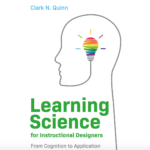I attended my first Learning and the Brain in 2008; I believe the topic was “The Science of Attention.”
Since then, I’ve attended at least two dozen: in New York, Chicago, Washington, San Francisco. Discussing Stress, and Memory, and Ethics, and Technology. And, of course, learning.
At some point, you might reasonably think, I’d get tired of the handouts and the slides and the coffee.
But, no: I still can’t get enough.
Reason #1: Old Friends
Being an interdisciplinary endeavor, the field of Mind, Brain, and Education is dramatically large…and comfortably small. When you come back, you start recognizing folks right away.
John Almarode presents regularly (and, with his bow tie, vivaciously) about applying cognitive science to the classroom. A post-presentation chat with John is one of the great learning experiences you’ll ever have.
I met Sarah Flotten — currently the interim Director of the Peter Clark Center for Mind Brain Education — through a friend several years ago. It’s now an annual event to catch up with her insights, her school, and her center.
Joanna Christodoulou (a former professor of mine) combines knowledge of neuroscience, knowledge of reading, and enthusiasm so compellingly that I’m still learning from her. I get to catch up with here every year or so at LatB.
This list could go on at length: Pooja Agarwal and Ellen Anderson, and even David Daniel (who doesn’t like it when I mention him in the blog).
In brief: if you want to find colleagues who think the way you do about teaching and learning, you’ll find them here. Even better: you’ll build relationships and coalitions that grow over the years.
Reason #2: New Friends
Once you enter the world of Mind, Brain, and Education — on this blog, on twitter, at the conferences — you’ll start meeting people from (literally) across the globe.
At this most recent conference in Boston, I FINALLY got to meet people I’ve been online chatting with for years.
Beth Hawks (twitter handle @PhysicsHawk) — a science teacher, who blogs here — offers a rare twitter presence. She is encouraging, wise, well-informed, and unwilling to be bamboozled by uplifting-but-empty slogans. I’ve been liking her posts for years, and got to meet her in Boston.
Kristin Simmers (@KristinASimmers) — currently studying the intersection of neuroscience and education — reached out to me about my first book AGES ago, and we’ve been in e-conversation ever since. Perhaps 2 years after that first e-exchange, we got to have lunch at the conference. Where else would I get to meet her in person?
Your MBE colleagues are out there — sometimes a continent away. You can meet them at the conferences.
Reason #3: SO MUCH TO LEARN
Of course, depending on your interests, this could be reason #1.
Even after 14 years, I still have so much to learn in this field. The speakers explore their research and insights — challenging me (and each other) to rethink settled ideas in light of new information.
For instance: on the very first day of the Boston conference, two speakers (politely, curiously) squared off on this important question: can we use conscious strategies to respond to stressful environments?
If the answer is “yes,” then we can guide our students (and our colleagues, and ourselves) down one path.
If the answer is “no” — because “stress turns off the pre-frontal cortex” — then we need a different path entirely.
What’s the correct answer? Honestly: check out Judson Brewer and Bessel van der Kolk to see whose analysis you find more persuasive.
The best place I know to hear these debates and have these conversations: Learning and the Brain.
Beyond FOMO
If you’re worried that you’ve missed out, I’ve got good news: the schedule for the February Conference in San Francisco has been posted!




